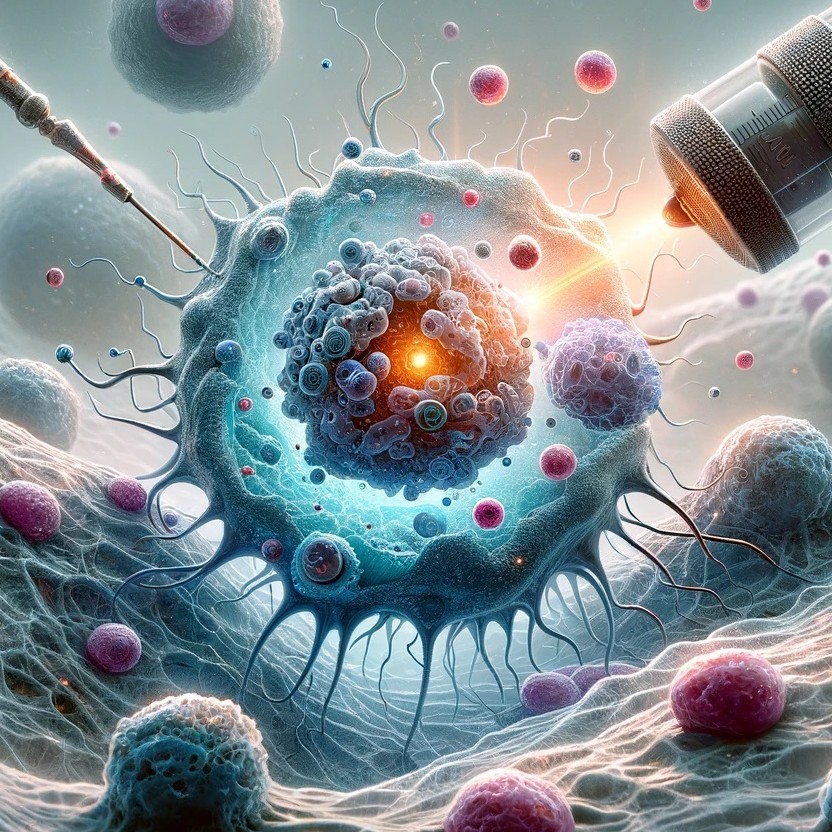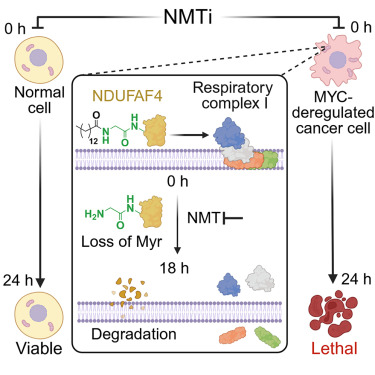

MYC is one of the most common drivers of several types of cancer. When MYC is overactive it boosts protein synthesis and cell metabolism and drives unregulated cell growth, acting like a stuck accelerator pedal, forcing cancer cells to grow, divide, and consume energy uncontrollably.
High levels of MYC are usually associated with aggressive cancers and poor patient outcomes. MYC cannot be targeted directly with traditional drugs therefore researchers have been looking for indirect ways to exploit weaknesses that MYC overactivation creates in cancer cells.
The team found an indirect way to target MYC-driven cancers by blocking an enzyme called N-myristoyltransferase (NMT) using a potent and selective inhibitor, IMP-1320. NMT activity was found to be essential to stabilise a crucial protein for energy production from the mitochondria, NDUFAF4. Without NMT, it becomes unstable and is degraded. This causes a collapse in the cell’s mitochondrial function and leads to the selective death of cancer cells overloaded with MYC.
The research showed promising results in animal models with complete or significant tumour shrinkage. Crucially, the drug was well tolerated, suggesting a significant therapeutic index exists to target MYC-deregulated cancers.

Graphical Abstract
This work has been a strong collaborative effort with the recent start up Myricx Bio and with co-founder Roberto Solari and their bioinformatics core in Francesco Falciani, which deepened the researchers’ understanding of what factors sensitise cells to NMT inhibition and helped uncover the link between MYC deregulation and NMT inhibitor sensitivity. These factors will inform possible future clinical trials, such as which diseases or patient populations to target.
Myricx Bio is a company that was also co-founded by Prof Ed Tate from Imperial and is now developing payloads for antibody drug conjugates (ADCs), based on NMT inhibitors. The company was recently awarded the Start Up Achievement Recognition Award from Cancer Research UK Horizons for raising £90m in one of Europe’s largest Series A funding rounds to advance its pipeline into the clinic.
This research is the first example of targeting a constitutive co-translational modification to treat MYC-deregulated cancers. Furthermore, this is the first systems-level analysis of the impact of NMT inhibitors on membrane fractions.
James Zhang says: “That mitochondrial respiration is selectively affected by NMT inhibitors in MYC-deregulated cells is extremely interesting and points to how NMT biology interacts with MYC biology. Furthermore, the possibility of targeting MYC-deregulated cancers, which are highly prevalent and associated with poor outcomes, using this approach presents a very exciting opportunity.”
This research opens up a promising new strategy for tackling a wide range of cancers once thought untreatable, paving the way for future therapies that exploit the hidden vulnerabilities of MYC.
Read the full paper: MYC deregulation sensitizes cancer cells to N-myristoyltransferase inhibition - ScienceDirect